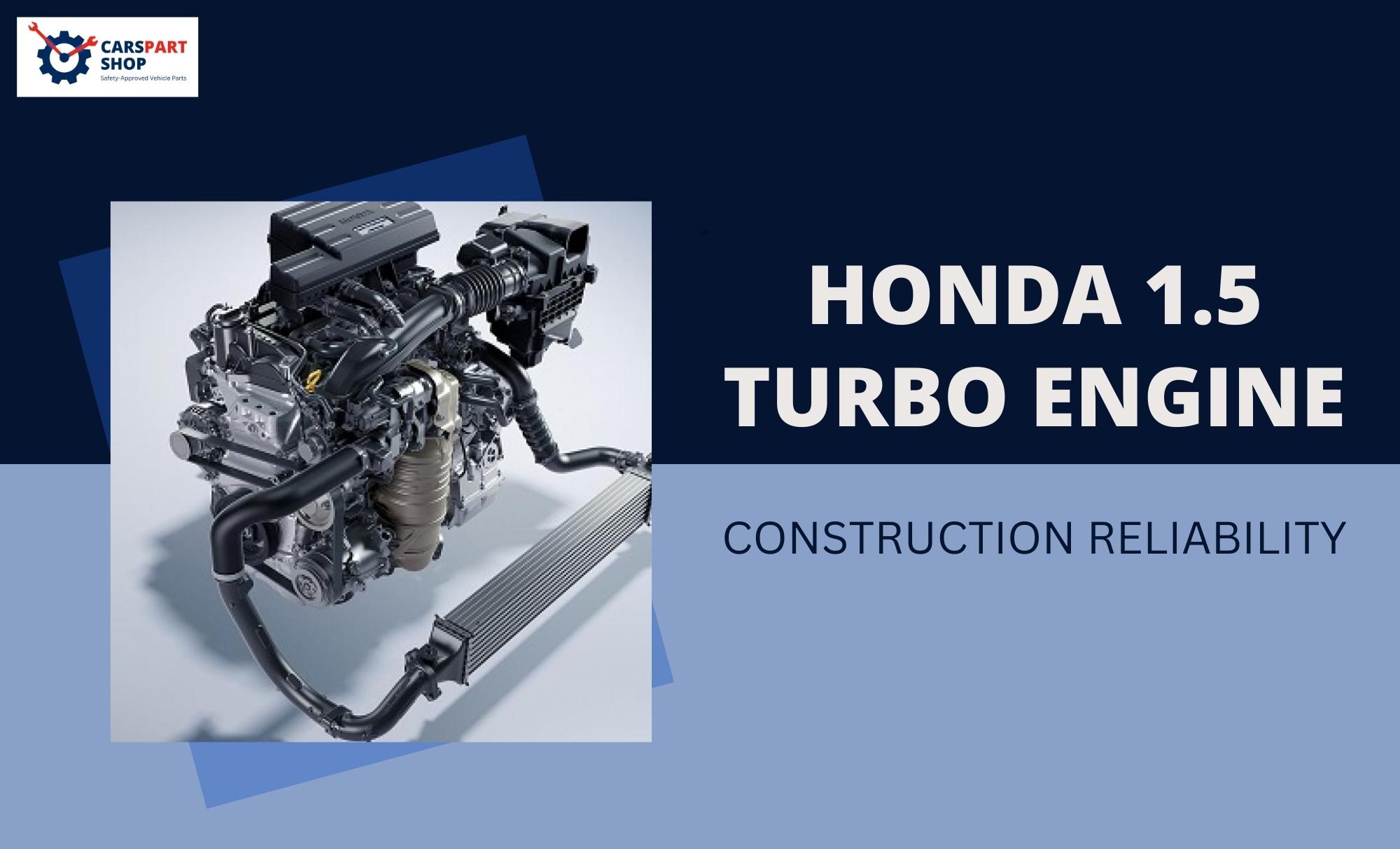Honda is known for producing reliable engines for all car segments, from high-racing performance to easy and luxury driving. In 2016, Honda introduced its 1.5-liter turbocharged gasoline engine. Honda was focused on developing more compact engines in tandem with a turbocharger to address the power issue. The 1.5L turbo engine offers fuel efficiency while producing respectable power and torque greater than a 2.4L engine’s torque. Honda 1.5 turbo engine reliability always surpasses its previous variants. It is available in eight versions. Due to its easy availability, more than 3 million units have been sold by Honda.
In the following blog, we will dive into the details of what are the key factors and specifications that have made the engine so efficient and reliable.

Table of Contents
ToggleHonda 1.5 Turbo Engine – Construction Reliability
Honda has been manufacturing the 1.5 turbo engine, a compact 4-cylinder engine, since 2016 up till the present. It uses a single turbo and direct injection to extract more power from the little engines. Moreover, multiple holes of the direct fuel injector are positioned in the middle of a combustion chamber, on top of a spark plug, and between two intake valves.
The Honda 1.5 turbo reliability is due to its outstanding performance. It is an amazing compact and fuel-efficient engine on the market right now. It is an entry-level engine. All Honda base models come with these four-cylinder engines. The DOHC (dual overhead cam) head design has four valves per cylinder. The engine also has twin overhead cams, like most of Honda’s engines. It is a well-built engine that utilizes an aluminum open-deck cylinder block with lightweight steel connecting rods. In this Honda engine, cavity-shaped pistons with improved skirt design help to reduce friction and vibration. Oil spray jets directed at the bottom of the piston are used to cool it. The actuators of the VTC are installed on the intake and exhaust camshafts.
Honda 1.5L Turbo Engine Specifications
The L15B7 VTC 1.5 turbo engine is a new stepping stone for Honda. The engine’s fundamental specifications are listed below.
| Engine Series | L-Series |
| Engine Class | L15B7 |
| Engine Alignment | Transverse |
| Compatible Fuel | Gasoline |
| Fuel System | Direct Injection |
| Engine Aspiration | Turbocharger, Intercooler |
| No. of Cylinder | Four |
| Valves Per Cylinder | Four |
| Cylinder Configuration | Inline-4 |
| Valvetrain | Dual Overhead Camshaft |
| Stroke | 3.52 inches |
| Bore | 2.87 inches |
| Capacity | 1,498cc or 1.5-liter (91.4 cubic inches) |
| Compression Ratio | 10.6:1 or 10.3:1 |
| Horsepower Output | 174 to 205 |
| Torque Output | 162lb-ft to 192lb-ft |
| Fuel Tank Capacity | 46 Litre |
| Oil Capacity | 3.7 quarts (3.5 liters) |
| Engine Oil Type | SAE 0W-20 |
Cars Equip With 1.5L Turbo Engine
By guaranteeing that it can give power and a fun ride while also attaining exceptional fuel efficiency, the Honda 1.5 turbo engine defies the norms. Honda L15B7 engines can be found in the following automobiles.
- Acura CDX – The Acura Integra 2023 is the first Acura equipped with a turbocharger. It will deliver 200 hp and 192 lb.-ft. of torque. Moreover, it will have a double overhead cylinder head along with dual VTC.
- Honda Civic Si – A 200-horsepower at 6,000 rpm engine powers the brand-new, high-performance 2022 Civic Si. It has VTEC, a 10.3:1 compression ratio, 17.8 psi of boost, and considerable power delivery enhancements.
- Honda CR-V – In the 2023 CR-V EX and EX-L models, you will also find a 1.5-liter turbocharged 4-cylinder engine. The engine produces 190 horsepower @ 6,000 rpm.
- Honda Accord – The 10th-generation Accord had the 1.5-liter Turbo in LX, EX, EX-L, Touring, and Sport grades. The VTEC was first time utilized in a 1.5-liter Turbo engine.
- Civic Sedan and Hatchback – The most recent 1.5-liter Turbo engine powers the new 11th generation Civic Sedan EX. You will also find the Civic Hatchback EX-L and Sport Touring with this engine.
- Civic Coupe – The 1.5-liter Turbo engine that powered the Civic Coupe had 205 horsepower and was only available with a manual transmission.
Honda 1.5L Turbo Problems and Fixes
Whatever car you have, you will always hate a malfunctioning engine. If you own any of the above Honda cars, then it will have a 1.5 T engine. In this section, we are going to discuss major problems in the 1.5 turbo engine and ways to resolve them. However, Some models might be more or less vulnerable to the issues we are going to address.
In cold climates, 1.5T engines are primarily affected by the problem of excess dilution of the oil. Fuel is more prone to adhere to the cylinder walls in a cold engine. Simply put, the fuel gets into the oil, and the oil and fuel mix and make a mess. It will lead to poor oil performance since the oil will lose its ability to lubricate the pistons and bearings. So, poor lubrication will cause the wearing of internal parts.
Over dilution of Oil
The 1.5 Turbo Honda engines are very efficient and take some time to warm up. Therefore, engines operating on shorter trips in cold climates are more vulnerable to fuel dilution issues. It was a serious problem in the 2018 Honda Accord 1.5 turbo engine and was also a major reason for the reduced Honda Accord life expectancy.
The major symptom that indicates a dilution of oil is
- Power loss.
- Vehicle Stalling.
- Misfire.
Thus, it will compromise the Honda 1.5 turbo reliability.
How to Fix it?
If you want to avoid the problem of excessive dilution of oil, you should follow these measures
- Warm the engine before using excessive power.
- Avoid idling for too long.
- Change the oil at regular intervals.
It is a good practice to change the oil on a regular basis. Moreover, Honda suggests an oil change interval every 9,000 miles. It’s an easy, quick, and cost-effective way to prevent your engine.
Carbon Growth on Honda 1.5 Turbo Engine
One of the main drawbacks of DI engines is carbon growth. In direct injection cars, the gas is sprayed at high pressure, turning the fuel into dust. It doesn’t work well because the oil that flows through the oil rings doesn’t have time to be rinsed out of the cylinder walls, eventually causing carbon accumulation.
The amount of build-up depends on how efficiently the Honda 1.5 Turbo controls and minimizes oil blow-by. The carbon build-up may be so severe that it entirely obstructs the intake ports, preventing them from sealing. It may cause the engine to misfire and have a choppy idle.
There are numerous indicators that give you a hint that there is a carbon build-up in Honda 1.5 Turbo Engine.
- Engine misfiring.
- Rough idling.
- Damaged spark plugs.
- Loss in engine power.
Ways to Avoid Carbon Growth
When you drive your Honda car with carbon build-up around its engine, you will hear a popping sound from the exhaust, causing the misfiring of the engine. There will be roughness while starting the car. Another symptom will be loss of power because your engine cylinders will not receive enough air, causing low compression. There will be problems with smooth acceleration also.
If you have carbon growth, walnut blasting is the best way to resolve it. It can cost around $500. Fine Walnut shell particles are applied through a high-pressure. The carbon is blown away from the valves by the pressurized air that has fine walnut particles. Thus, it cleans the engine’s intake manifold and valves. Additionally, liquid chemicals are put inside the valves. After a short while, through a vacuum, you can remove this solution from the valve. Finally, you will have a carbon-free engine.
Issues with your Spark Plug
Two things primarily bring on your spark plug issues. One is internal engine carbon accumulation, and the other is spark plug wear. It is a minor problem in the Honda Civic or Honda accord 1.5 turbo engine.
When deposits build up on the plugs, it makes it harder for them to ignite the air-fuel mixture in the cylinder correctly. Turbocharged engines have a reputation for excessive spark plug wear.
Spark plug issues with the Honda 1.5L Turbo manifest as:
- Misfires
- Loss of power
- Abnormal idle
How to Resolve it?
When the spark plugs start to fail, they are unable to produce a strong enough spark to ignite the mixture of air and fuel, causing misfiring. It will ultimately affect the Honda 1.5 turbo reliability.
Installation of new spark plugs is the only solution. These engines’ spark plugs typically last for roughly 30,000 miles. You won’t have any severe engine problems if you replace them at this time. The 1.5-turbo Honda engine has four spark plugs. Each spark plug costs between $10 and $20. So, Spark plug replacement is an inexpensive process.
If your Honda 1.5 T engine has severely malfunctioned, then it’s time to replace it. Buying a new engine can burn a hole in your pocket. So, you can go for used engines. Used honda civic 1.5 turbo engines or for your Honda Accord, CR-V is easily available on various used car parts online platforms. It is less expensive.
Frequently Asked Questions
The compact Honda 1.5L engine comes with a turbocharger and intercooler. It offers a good mix of fuel efficiency and power. With proper maintenance, it can outperform many other competitor engines. Regular oil changes and carbon accumulation removal can increase the Honda 1.5 turbo reliability.
The Honda 1.5L turbo engines are compact in design and highly fuel efficient. It can easily last 150,000 miles. If the proper care is taken, it can survive more than 200,000 miles.
The used Honda 1.5 T engines are easily available in the market. The assembly replacement cost can be around $1800 to $2500. The labor cost depends on the body shop and location. However, you can expect to pay $500 to $1500.
The 1.5T engine in Honda civic produces 174 horsepower, whereas the Honda Civic Si is capable of producing 205 horsepower.
Yes, in the Honda Accord. the VTEC technology was employed for the first time. It maintains all the advantages of a compact engine in terms of fuel efficiency while adding a direct injection, turbocharger, and variable valve timing.







